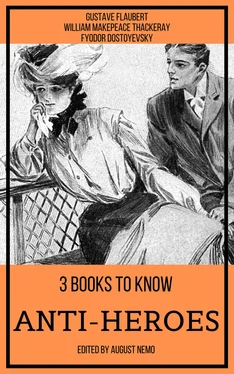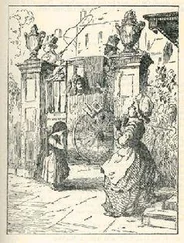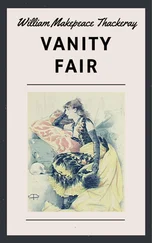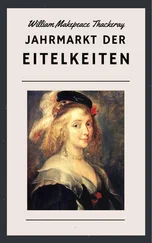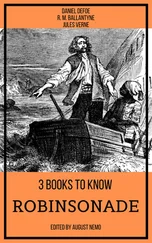My people were not a little anxious regarding me, by the time I returned to Carlow, and the landlord was very much afraid, he said, that the highwaymen had gotten hold of me. There, too, my name and station had been learned from my servant Fritz: who had not spared his praises of his master, and had invented some magnificent histories concerning me. He said it was the truth that I was intimate with half the sovereigns of Europe, and the prime favourite with most of them. Indeed I had made my uncle’s order of the Spur hereditary, and travelled under the name of the Chevalier Barry, chamberlain to the Duke of Hohenzollern-Sigmaringen.
They gave me the best horses the stable possessed to carry me on my road to Dublin, and the strongest ropes for harness; and we got on pretty well, and there was no rencontre between the highwaymen and the pistols with which Fritz and I were provided. We lay that night at Kilcullen, and the next day I made my entry into the city of Dublin, with four horses to my carriage, five thousand guineas in my purse, and one of the most brilliant reputations in Europe, having quitted the city a beggarly boy, eleven years before.
The citizens of Dublin have as great and laudable a desire for knowing their neighbours’ concerns as the country people have; and it is impossible for a gentleman, however modest his desires may be (and such mine have notoriously been through life), to enter the capital without having his name printed in every newspaper and mentioned in a number of societies. My name and titles were all over the town the day after my arrival. A great number of polite persons did me the honour to call at my lodgings, when I selected them; and this was a point very necessarily of immediate care, for the hotels in the town were but vulgar holes, unfit for a nobleman of my fashion and elegance. I had been informed of the fact by travellers on the Continent; and determining to fix on a lodging at once, I bade the drivers go slowly up and down the streets with my chariot, until I had selected a place suitable to my rank. This proceeding, and the uncouth questions and behaviour of my German Fritz, who was instructed to make inquiries at the different houses until convenient apartments could be lighted upon, brought an immense mob round my coach; and by the time the rooms were chosen you might have supposed I was the new General of the Forces, so great was the multitude following us.
I fixed at length upon a handsome suite of apartments in Capel Street, paid the ragged postilions who had driven me a splendid gratuity, and establishing myself in the rooms with my baggage and Fritz, desired the landlord to engage me a second fellow to wear my liveries, a couple of stout reputable chairmen and their machine, and a coachman who had handsome job-horses to hire for my chariot, and serviceable riding-horses to sell. I gave him a handsome sum in advance; and I promise you the effect of my advertisement was such, that next day I had a regular levee in my antechamber: grooms, valets, and maitres-d’hotel offered themselves without number; I had proposals for the purchase of horses sufficient to mount a regiment, both from dealers and gentlemen of the first fashion. Sir Lawler Gawler came to propose to me the most elegant bay-mare ever stepped; my Lord Dundoodle had a team of four that wouldn’t disgrace my friend the Emperor; and the Marquess of Ballyragget sent his gentleman and his compliments, stating that if I would step up to his stables, or do him the honour of breakfasting with him previously, he would show me the two finest greys in Europe. I determined to accept the invitations of Dundoodle and Ballyragget, but to purchase my horses from the dealers. It is always the best way. Besides, in those days, in Ireland, if a gentleman warranted his horse, and it was not sound, or a dispute arose, the remedy you had was the offer of a bullet in your waistcoat. I had played at the bullet game too much in earnest to make use of it heedlessly: and I may say, proudly for myself, that I never engaged in a duel unless I had a real, available, and prudent reason for it.
There was a simplicity about this Irish gentry which amused and made me wonder. If they tell more fibs than their downright neighbours across the water, on the other hand they believe more; and I made myself in a single week such a reputation in Dublin as would take a man ten years and a mint of money to acquire in London. I had won five hundred thousand pounds at play; I was the favourite of the Empress Catherine of Russia; the confidential agent of Frederick of Prussia; it was I won the battle of Hochkirchen; I was the cousin of Madame Du Barry, the French King’s favourite, and a thousand things beside. Indeed, to tell the truth, I hinted a number of these stories to my kind friends Ballyragget and Gawler; and they were not slow to improve the hints I gave them.
After having witnessed the splendours of civilised life abroad, the sight of Dublin in the year 1771, when I returned thither, struck me with anything but respect. It was as savage as Warsaw almost, without the regal grandeur of the latter city. The people looked more ragged than any race I have ever seen, except the gipsy hordes along the banks of the Danube. There was, as I have said, not an inn in the town fit for a gentleman of condition to dwell in. Those luckless fellows who could not keep a carriage, and walked the streets at night, ran imminent risks of the knives of the women and ruffians who lay in wait there,—of a set of ragged savage villains, who neither knew the use of shoe nor razor; and as a gentleman entered his chair or his chariot, to be carried to his evening rout, or the play, the flambeaux of the footmen would light up such a set of wild gibbering Milesian faces as would frighten a genteel person of average nerves. I was luckily endowed with strong ones; besides, had seen my amiable countrymen before.
I know this description of them will excite anger among some Irish patriots, who don’t like to have the nakedness of our land abused, and are angry if the whole truth be told concerning it. But bah! it was a poor provincial place, Dublin, in the old days of which I speak; and many a tenth-rate German residency is more genteel. There were, it is true, near three hundred resident Peers at the period; and a House of Commons; and my Lord Mayor and his corporation; and a roystering noisy University, whereof the students made no small disturbances nightly, patronised the roundhouse, ducked obnoxious printers and tradesmen, and gave the law at the Crow Street Theatre. But I had seen too much of the first society of Europe to be much tempted by the society of these noisy gentry, and was a little too much of a gentleman to mingle with the disputes and politics of my Lord Mayor and his Aldermen. In the House of Commons there were some dozen of right pleasant fellows. I never heard in the English Parliament better speeches than from Flood, and Daly, of Galway. Dick Sheridan, though not a well-bred person, was as amusing and ingenious a table-companion as ever I met; and though during Mr. Edmund Burke’s interminable speeches in the English House I used always to go to sleep, I yet have heard from well-informed parties that Mr. Burke was a person of considerable abilities, and even reputed to be eloquent in his more favourable moments.
I soon began to enjoy to the full extent the pleasures that the wretched place affords, and which were within a gentleman’s reach: Ranelagh and the Ridotto; Mr. Mossop, at Crow Street; my Lord Lieutenant’s parties, where there was a great deal too much boozing, and too little play, to suit a person of my elegant and refined habits. ‘Daly’s Coffee-house,’ and the houses of the nobility, were soon open to me; and I remarked with astonishment in the higher circles, what I had experienced in the lower on my first unhappy visit to Dublin, an extraordinary want of money, and a preposterous deal of promissory notes flying about, for which I was quite unwilling to stake my guineas. The ladies, too, were mad for play; but exceeding unwilling to pay when they lost. Thus, when the old Countess of Trumpington lost ten pieces to me at quadrille, she gave me, instead of the money, her Ladyship’s note of hand on her agent in Galway; which I put, with a great deal of politeness, into the candle. But when the Countess made me a second proposition to play, I said that as soon as her Ladyship’s remittances were arrived, I would be the readiest person to meet her; but till then was her very humble servant. And I maintained this resolution and singular character throughout the Dublin society: giving out at ‘Daly’s’ that I was ready to play any man, for any sum, at any game; or to fence with him, or to ride with him (regard being had to our weight), or to shoot flying, or at a mark; and in this latter accomplishment, especially if the mark be a live one, Irish gentlemen of that day had no ordinary skill.
Читать дальше
